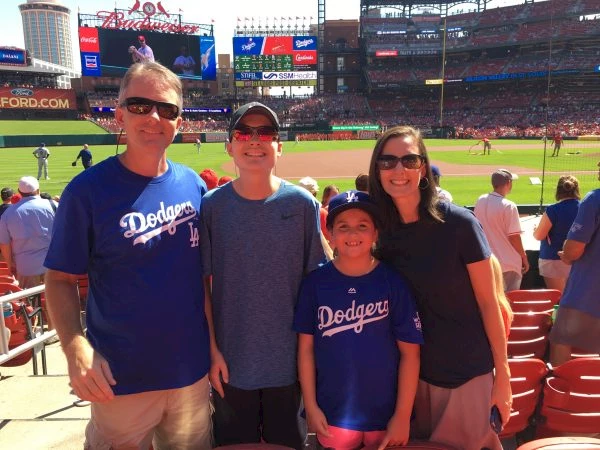The Road to Success: Will Stuckey’s Journey with Autism

When you first meet Will Stuckey it is not hard to be captivated by his wit and bright personality. You could say he is somewhat of a legend as he walks the halls of the ACCESS Academy. Former teachers and therapists greet him with excitement wanting to reminisce of memories together. “Let’s let sleeping dogs lie,” Will professes in his deep, directive voice. You can tell he means business. He is eager to share of who he is today.
At 16, he is a sophomore at Joe T. Robinson High School in Little Rock. He is an honor roll student and was recently invited to join the National Honor Society. “It’s multifactorial. It’s more than just grades, it is about one’s character and leadership skills,” his mother Ashley says. “We are proud of his participation in choir, band, beta club, guitar club and various social activities both at school and in church. We never envisioned that he would be thriving to this extent.”
Ashley and Joe Stuckey think back to the “quiet, easy, laid-back baby” they once knew. “It was such a wonderful thing at the time,” Ashley reminisced, “but as he got a little bigger we realized there was a reason he was so quiet.” By Will’s first birthday, they realized something was not quite right.
At Will’s one-year checkup, the pediatrician was concerned about his speech development. With reservation, Ashley and Joe waited with uncertainty until a speech pathologist friend encouraged them to seek an evaluation. Ashley remembered, “His speech was not developing. He was making babbling sounds, maybe a word here and there.” Near his second birthday, they set up an evaluation with a speech pathologist. After just one or two sessions, “He literally started talking,” recalled Ashley. “One day he did not, the next day he did.” Will was discharged by the therapist.
But the family made observations about his speech over the next few weeks. “It was a running monologue based on observation, but still no interactive communication,” Ashley shared. “He was describing everything in his mind, everything he would see, but it was difficult for him to request what he wanted.” Ashley remembered that they would be at the park and Will would run to play with the other children, but he could not figure out how to interact with them. “He had no idea what to do.”

Around his third birthday, Ashley and Joe made an appointment at the Dennis Developmental Center, and Will was diagnosed with autism spectrum disorder. They started researching developmental preschools. Ashley said, “we were blown away by what we found at ACCESS.” Unfortunately, there was a waiting list.
They took an opening at another center but Ashley recalled crying each day as she dropped her son off. She knew “this was not where he needed to be to get the help he needed.” She prayed for the day that they would receive the call from ACCESS. Within a few months, that call came and Will was enrolled at ACCESS in May 2006.
Reflecting on Will’s first day at ACCESS, Ashley expressed, “I had such a peace and confidence, such gratitude. I did not shed a tear. I did a happy dance dropping him off and picking him up.” Susan Lockhart and Tim Thomas were Will’s first teachers. “He felt instantly at home here – we all felt at home. Will was off to a great start. He was finally here! That familial feeling was there from day one,” the family recalled.
Will made slow and steady progress at first. Then around the second or third grade, things became more difficult for him academically and socially. Joe expressed, “We still felt we were in the right place and doing all the right things, but it just became harder. It felt like we hit a wall.”
In 2012, the family moved to the outskirts of Little Rock. They felt it would be good for Will to have more open space; not as socially challenging for him. Joe professed, “He just cratered. We were going backwards.” Will was losing some of the skills he had worked so hard to achieve. “That’s when it got scary for a while. No one seemed to understand, nobody had seen that happen before.”
“ACCESS was there every step of the way,” expressed Ashley. “It was a definite team effort, it always has been.” ACCESS Academy and Young Adult Director Cheri Stevenson added, “Even when the days were hard, it made our team’s journey more successful due to the family’s commitment. They were very open and receptive to all recommendations.” They listened to suggestions from his teachers, therapists, academic therapists, and his ABA therapist Jennifer Nash. They worked hand-in-hand with his doctors. Joe added, “We could not have made it through without Ms. Mary Stuart’s (Will’s teacher at the time) patience in the classroom. I do not think he would have come out of that dark hole without that team approach.”

As Will continued to progress, they decided to “step out on faith” to try a charter school. Ashley said, “We were terrified to leave this setting where we knew he was safe and learning. It would have been wonderful for him to stay and we were comfortable with that, but could he do more?”
During the transition, Ashley remarked, “Tammy and Cheri came to meetings with us to establish his IEP which gave such peace of mind. I was afraid I would not be able to advocate appropriately without their guidance. They were able to speak to his background, his history at ACCESS. Once again, the team graciously went above and beyond, as they always do.”
This new learning environment did not prove to be the best opportunity for Will. The family decided to homeschool him for his eighth-grade year. “It was difficult,” recalled Joe. “The best thing that came out of it was that it was an exceedingly strong motivation from both Will and us to go back to traditional school.”
Reluctant yet confident, Ashley and Joe enrolled Will at Joe T. Robinson in 2017. “He didn’t know a soul when he walked into the school,” they remarked. “Social interactions are hard with an autism diagnosis, but peer motivation has been a positive thing for him. Band and choir has given him a built in peer group. He is in a good place with his classes. They are just challenging enough, but we have to be careful, can’t hit that wall.”
Will is a teenager now, finding a balance between social life and academics. “He doesn’t want to be held back by his diagnosis. He wants to be seen as anyone else his age. Things that clearly defy his comfort zone – going to a school where he didn’t know anyone, playing in the band, voluntarily speaking in front of the entire church – he pushes through that fear and takes on challenges.” Ashley exclaimed, “We would never have guessed a few years ago that he would be thriving in every conceivable way. He even has his driver’s license – he drove us here today! I just marvel over his bravery, courage and tenacity of spirit, especially in the past two years. There is not anything he won’t try at this point.”

The Stuckeys are rooted with strong faith and family. Will has a younger sister, Sidney, who is nine years old. “They are very supportive of each other. They have each other’s backs,” Ashley commented. “At the young age of nine, Sidney understands that life is harder for her brother, and that his challenges are very real and different from hers. As she matures, she will understand more.”
When asked what they hope for Will in the future, Joe remarks, “first, we will never place limitation on him. I am 100% certain that he has a special purpose, and we are in the process of figuring it out like you are with any kid.” Joe offered, “More specifically, will he be able to work and live independently? He is super motivated and driven for success. He’s interested in having a job, making money and being responsible for himself. That is the kind of thing that you hope for.”
As for Will, he is quick to share his memories of ACCESS, especially “the staff and how they helped me and my disability. I felt like I could strive in everything I did. After I graduate, I hope to get a job here.” “ACCESS is unique and very special,” Joe adds. “There is nothing else like it in the state. We could not be more thankful for this organization. We will never forget.”
For parents with young children who might be struggling with delays, Ashley encourages them to seek help. “Early intervention is key! Looking back, you will never regret seeking that opinion. Getting that evaluation could change the trajectory of your child’s future. Every day is critical, especially when they are so young. Call the ACCESS Evaluation and Resource Center. Find your path. Make your plan. Get your map. Dive in.”
Joe‘s advice for those families walking that journey now: “Hold on to that rope. Do not let it go.” Ashley added, “In those dark days, in those valleys, in the pit, remember today is not the end. Today is one day in a journey. Keep moving forward.”